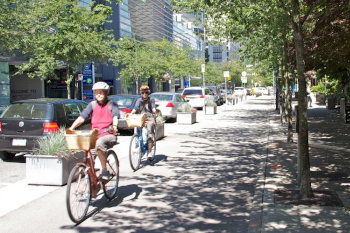The Government has pledged to release £250m to councils for the reallocation of road space to active travel 'within weeks', as part of a wider multi-billion pound package, backed by statutory guidance.
In reaction to the coronavirus pandemic, the Department for Transport's (DfT) fast-tracked statutory guidance states local authorities 'in areas with high levels of public transport use should take measures to reallocate road space to people walking and cycling'.
However, despite the urgency, so far there has been no detail on how the cash will be released to councils and whether maximum allocations will take account of public transport use and traffic levels.
A DfT spokeswoman confirmed: 'More details on how the funding will be allocated will be published in due course.'
Sources close to the process suggested the details are being worked on and could be ready within a week, adding that councils have the powers to implement the moves the DfT is calling for, which can be temporary and of minimal cost.
The government also plans to create 'a national cycling and walking commissioner and inspectorate' as part of a revamped national cycling and walking strategy this summer.

'Local authorities where public transport use is low should be considering all possible measures,' the DfT said.
A £250m emergency active travel fund will be released from a previously announced £5bn package for cycling and buses to pay for 'pop-up bike lanes with protected space for cycling, wider pavements, safer junctions, and cycle and bus-only corridors'.
No law has been changed and the DfT concedes that none of the intervention measures are new – 'they are interventions that are a standard part of the traffic management toolkit, but a step-change in their roll-out is needed to ensure a green restart'.nce
The move is designed to both to encourage active travel and to enable social distancing - staying two metres apart - during the restart after the national lockdown.
The cash is the first stage of a £2bn investment in active travel investment the government said.
Transport secretary Grant Shapps said: 'There’s been a 70% rise in the number of people on bikes - for exercise, or for safe, socially distanced travel. When the country gets back to work, we need them to carry on cycling, and to be joined by millions more. With public transport capacity reduced, the roads in our largest cities, in particular, may not be able to cope without it.
'We recognise this moment for what it is: a once in a generation opportunity to deliver a lasting transformative change in how we make short journeys in our towns and cities. According to the National Travel Survey, in 2017-18 over 40% of urban journeys were under two miles – perfectly suited to walking and cycling.
'The Government therefore expects local authorities to make significant changes to their road layouts to give more space to cyclists and pedestrians. Such changes will help embed altered behaviours and demonstrate the positive effects of active travel.
'I’m pleased to see that many authorities have already begun to do this, and I urge you all to consider how you can begin to make use of the tools in this guidance, to make sure you do what is necessary to ensure transport networks support recovery from the COVID-19 emergency and provide a lasting legacy of greener, safer transport.'
An updated Cycling and Walking Investment Strategy is also due in the summer, with measures aimed at doubling cycling and walking by 2025. These include:
- the creation of a national cycling and walking commissioner and inspectorate
- higher standards for permanent infrastructure across England getting GPs to prescribe cycling and exercise
- creating a long-term budget for cycling and walking similar to what happens for roads
Intervention measures to be considered:
- Installing ‘pop-up’ cycle facilities with a minimum level of physical separation from volume traffic for example, mandatory cycle lanes, using light segregation features such as flexible plastic wands or quickly converting traffic lanes into temporary cycle lanes (suspending parking bays where necessary); widening existing cycle lanes to enable cyclists to maintain distancing. Facilities should be segregated as far as possible.
- Using cones and barriers to widen footways along lengths of road, particularly outside shops and transport hubs.
- Encouraging walking and cycling to school, for example through the introduction of more ‘school streets’. Pioneered in London, these are areas around schools where motor traffic is restricted at pick-up and drop-off times, during term-time.
- Reducing speed limits: 20mph speed limits are being more widely adopted as an appropriate speed limit for residential roads.
- Introducing pedestrian and cycle zones by restricting access for motor vehicles at certain times (or at all times) to specific streets, or networks of streets, particularly town centres and high streets.
- Modal filters (also known as filtered permeability); closing roads to motor traffic, for example by using planters or large barriers.
- Providing additional cycle parking facilities at key locations, such as outside stations and in high streets.
- Changes to junction design to accommodate more cyclists – for example, extending Advanced Stop Lines at traffic lights to the maximum permitted depth of 7.5 metres where possible.
- ‘Whole-route’ approaches to create corridors for buses, cycles and access only on key routes into town and city centres.
- Identifying and bringing forward permanent schemes already planned, for example under Local Cycling and Walking Infrastructure Plans, and that can be constructed relatively quickly.
Traffic Regulation Orders
The DfT guidance states that some interventions, including new lightly-segregated cycle lanes, will not require Traffic Regulation Orders (TROs). Others will require TROs, of which there are different types.
The main ones are:
- Permanent: this process includes prior consultation on the proposed scheme design, a 21-day notice period for statutory consultees and others who can log objections; there can be a public inquiry in some circumstances.
- Experimental: these are used to trial schemes that may then be made permanent. Authorities may put in place monitoring arrangements, and carry out ongoing consultation once the measure is built. Although the initial implementation period can be quick, the need for extra monitoring and consultation afterwards makes them a more onerous process overall.
- Temporary: these can be in place for up to 18 months. There is a seven-day notice period prior to making the TRO and a 14-day notification requirement after it is made, plus publicity requirements. These are most suitable for putting in place temporary measures and road closures.



